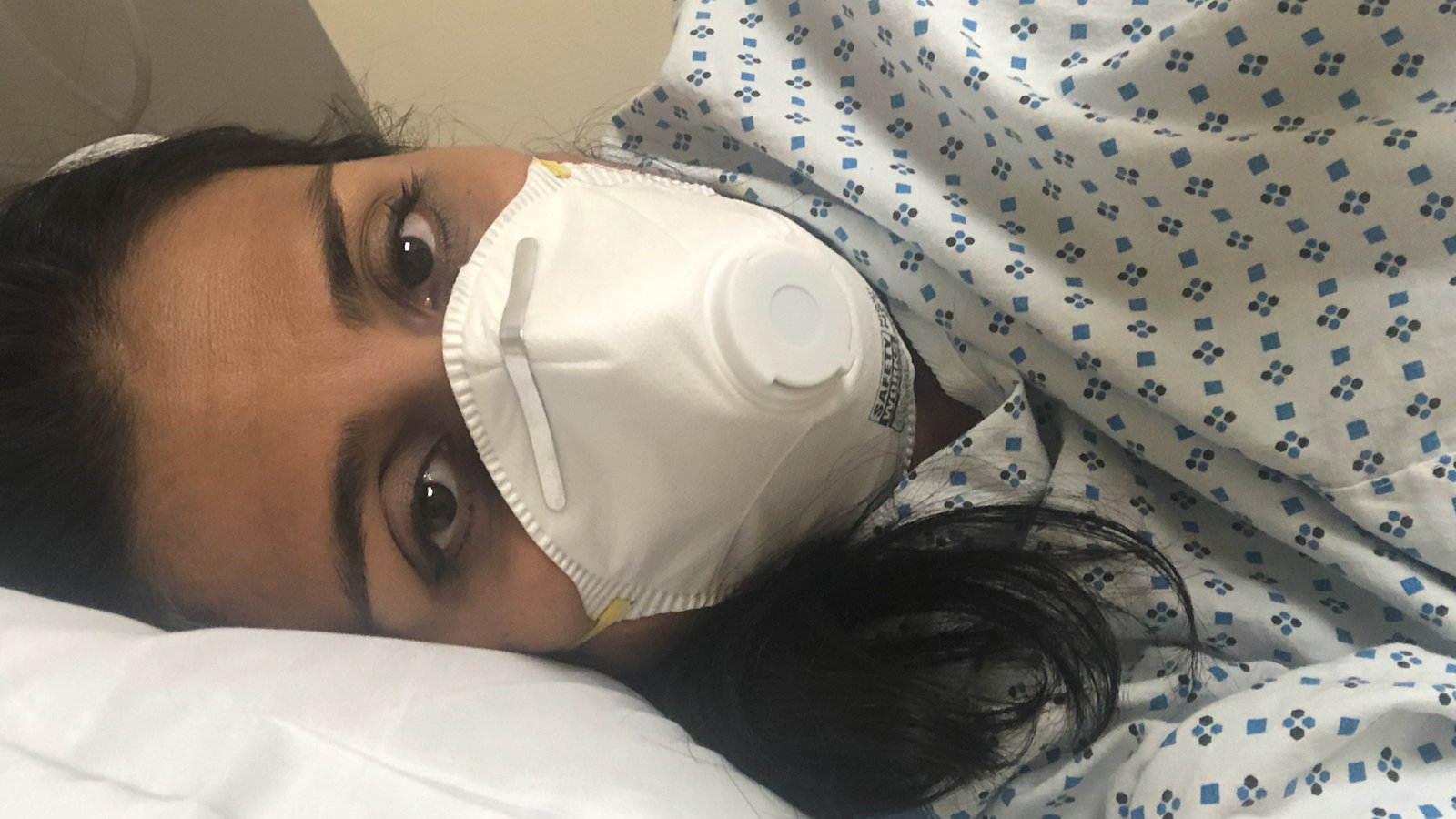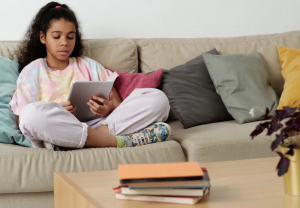Quarantine Diaries: Poonam
‘I’m Officially Scared’: Giving Birth in a Hospital During a Pandemic
Back
transcript
What it’s Like to Give Birth in the Middle of a Pandemic
Poonam Sharma Mathis documented her experience having a baby in New York City, just as hospitalizations and deaths from coronavirus were starting to rise.
-
“Hi, Poonam.” “Hi. Nice to meet you. My contractions are about 15 minutes apart. And I’m about to get pulled into an O.R. at Cornell to have a C-section. Like any minute now, they’re going to come pull me through that door. And I’m gloved-up and masked-up. And my husband’s all suited-up. He’s literally in a hazmat suit.” Doctor: “Dad, do you want to grab those shoes and throw them?” “They’re pulling me in. I have to go. Thank you. My name is Poonam Sharma Mathis. My husband is Kris Mathis. We have a 4½-year-old, Pierce Mathis.” “I need some Monday motivation, Pierce.” “My first birth was pretty uneventful. The baby came out, we made eye contact and then I closed my eyes, and I woke up in the recovery room. Everybody was kissing him and hugging him. And I felt like the community and the village that he’s so blessed to be a part of was there. I grew up with a lot of extended family and a lot of love. We’d been wanting a girl in this generation so badly. So when we found out we were having a girl, we were just grateful. I was 37 weeks pregnant when they started to issue stay-at-home orders. OK, so I am officially scared. I’m having contractions this morning. I am not a hypochondriac. I’m not somebody who’s really prone to general mass hysteria. But we are — I’m breathless. We are dealing with something we don’t understand.” Kris: “Only a couple of days prior to our birth, they had been saying no partners, no spouses. I was probably one of the first spouses that was allowed into the hospital. I was walking, and it was like, do not touch anything. Make sure your mask is on. Put the booties over your shoes.” “My husband could catch it right now. Right? He could bring it home, and give it to my son who’s 4 and a half. And there’s a thought about going home with my daughter, and then just immediately quarantining myself and my daughter.” Doctor: “All right, Mom, are you ready?” “Do you want to open your eyes for me? No? Her name is Asha: 7 pounds, 11 ounces. They put her skin on my chest. But I had a mask on, so I wasn’t breathing on her. Daddy is cuddling with her.” “It’s weird. She opened her eyes right when she was born — really wide. And then I haven’t seen her eyes since. She didn’t like what she saw or something. Our expectations were that I probably wasn’t going to be there anyway. So just being there for the delivery and seeing the baby, meeting the baby, it was a really exciting thing for me.” “You realize you have to do a father-daughter dance, and give her away one day?” “But then immediately after the birth, I had to say goodbye.” “Say, good night.” “Sweet dreams.” “It’s 11:30 at night. I’m in my room. I just breastfed. [Asha crying] I wore a mask, and I threw up. The only good news is they let her stay in my room because babies are not being kept in the nursery right now. They’re being kept with the mom. The next step is that we are waiting for news of my coronavirus status. Based on that result, they’ll decide how much interaction I’ll be having with her, for her own safety. So now we wait. I just want to kiss her. It was really exciting to find out that we tested negative, because that meant I could kiss her head. But it’s definitely different delivering and recovering in a hospital during coronavirus, and it hit me yesterday. Yesterday was the worst day of physical pain in my life. I genuinely thought I might die. This is one of the most intense surgeries you can have, is a C-section. But if you have any air bubbles that go into your stomach when they cut you open, which is normal, those air bubbles don’t come out right away. Then they float around your body, I guess, and they feel like knives stabbing you from the inside until they come out. And they don’t want to come out. It is so traumatic being here without somebody to advocate for you when things go wrong, because there’s too much going on. They are overwhelmed. I’m pushing the call button to get care, and they don’t come right away. And last time I gave birth here, four and a half years ago, they did everything right away because they were able to. I was in so much pain for so long, and waiting for my medication for so long, that I was throwing up. I threw up eight times from pain. It feels like I was in a horror movie where they chopped somebody up, but then the person escapes and is running to safety. And that’s a ridiculous thing to say. We have the best health care. We’re in the best city. But that’s how it feels. I just want to get her home as soon as possible. And hopefully then I’m able to walk and stand, and do something to help my husband take care of these kids. Thursday at around 1:30, my husband and son came and picked us up. She was so excited to meet you she didn’t know what to do.” “Asha.” “I haven’t left the upstairs from Thursday till now. It’s Monday morning. There’s so much family that’s just waiting, itching to rush in and be with us. And who knows if that will happen before she’s 3 months old.” “One toe is kind of curving.” “Yeah.” “Will she wrap her finger around your finger if you put it in there?” Poonam: “She’s like a little animal, huh?” “You’re going to be such a good big brother.” Poonam: “Mm-hmm. I’m just grateful that she’s healthy. I’m grateful that so far, my husband and myself and my son are healthy. I look at her eyes, and I do believe that the eyes show something even from birth. Whenever she does open her eyes, she just looks and she’s just laser-focused. And it’s not a curious focus. It’s like — like she knows she needs to be calm right now or something. I had a great aunt who always said that if she could come back, she’d come back as my daughter. So maybe that’s her, I hope. If so, nothing’s going to keep her down.”
“We didn’t touch her face. We didn’t touch her skin. We didn’t breathe on her.”
___
Two weeks after New York City shut down, Poonam Sharma Mathis went into labor.
She had once harbored deep fears about childbirth, but those were soothed when her son, Pierce, was born four years ago without complications. At 42 years old, Poonam was delighted to be pregnant again, this time with a girl. “You’ll never be alone now,” she wrote in a note to Pierce. She bought herself a pink nightgown to match her future daughter’s pink onesie, envisioning their first picture together.
Then came the coronavirus outbreak. Poonam’s anxiety began to grow as the death toll rose. Her scheduled cesarean suddenly seemed ominous. It was possible her husband, Kris, 42, would not be allowed by her side. “This will be the worst time to be gutted like a fish,” she thought.
Mid-March: The fear sets in
Worried about the impending apex, Poonam attempts unsuccessfully to move her delivery date up. An article about a newborn with Covid-19 is particularly rattling.
Poonam decides to channel her fears into recording a podcast about her experience. Her work as an entrepreneur (she had been raising money for her second start-up — a co-working space with licensed on-site child care) is on hold anyway. The podcast will be a release for her; a way to start a discussion about the unknown.
“So, I’m officially scared,” she announces on the first episode.
March 30: Going into labor and meeting a baby girl (through a mask)
Poonam begins having contractions. She and Kris arrive at NewYork-Presbyterian/Weill Cornell Medical Center, which is already slammed with critically ill patients. More than 1,200 people have died from Covid-19 and Gov. Andrew M. Cuomo says the worst is yet to come.
Kris is allowed inside after his temperature is taken at the door. The nurses assure them that everything is going to be fine. Kris is ordered to wear a surgical apron, gloves, bootees and a mask. Once Poonam’s contractions are 15 minutes apart, she is wheeled into the triage room where her nose is swabbed for a Covid-19 test.
At 6:33 p.m., Asha is born. She is 7 pounds, 11 ounces with wise, brown eyes. After about a half-hour in the recovery room, Kris is asked to leave.
March 31: A really, really bad night
Poonam breastfeeds while wearing a mask, her face turned to the side. Later, she learns that she has tested negative for Covid-19. She kisses her daughter for the first time. That night, stabbing pain keeps her awake. It feels as if she has been sawed in half. She has trouble catching her breath. She throws up eight times. She weeps. Meanwhile, Asha cries to be fed.
April 1: The recovery continues to be ‘brutal’
Standing seems to make breathing more comfortable, so Poonam slowly paces her room. After a harrowing night, she’s still in pain. “The whole recovery has been really brutal,” she says. “I think the nurses are doing their best. And the moms are doing their best. But it is so traumatic being here without somebody to advocate for you.” She thinks back to when her son was born and how family members flocked to the hospital. This birth has felt so lonely.
April 2: Going home and staying there
There have now been more than 1,500 deaths from Covid-19 and nearly 52,000 confirmed cases in the city.
Waiting to be discharged from the hospital, Poonam is anxious to be reunited with Kris and Pierce, even if it means being stuck inside their home in Manhattan. Outside the hospital, Pierce is thrilled to meet his sister in person. “Asha,” he says with glee, the name new and exciting. “Asha, wake up, I’m your big brother.”
Now: A new baby and a new reality
Poonam has been home for more than a month. The pain subsided a couple weeks ago, she struggles now with bending down and physical exhaustion.
Asha is a good sleeper with a sweet disposition and a bit of colic. Pierce likes to kiss her when she cries. There have been dozens of family phone calls and video chats. And a trip to the window of Poonam’s parents’ home where hands were pressed to glass.
The loveliness of having a newborn is offset only by an uncertainty about what lies ahead, how long this all must go on.
“The future, I have no idea, I just wait and see,” Poonam says. “But I don’t feel deep terror. I just feel sadness.”
Text
Corina Knoll
Producers
Alexandra Eaton and Corina Knoll
Video Editor
Kevin Oliver
Video
Poonam Mathis
Graphics
Antonio de Luca
Senior Producers
Sameen Amin, Meghan Louttit and Dodai Stewart
Executive Producer
Solana Pyne



















